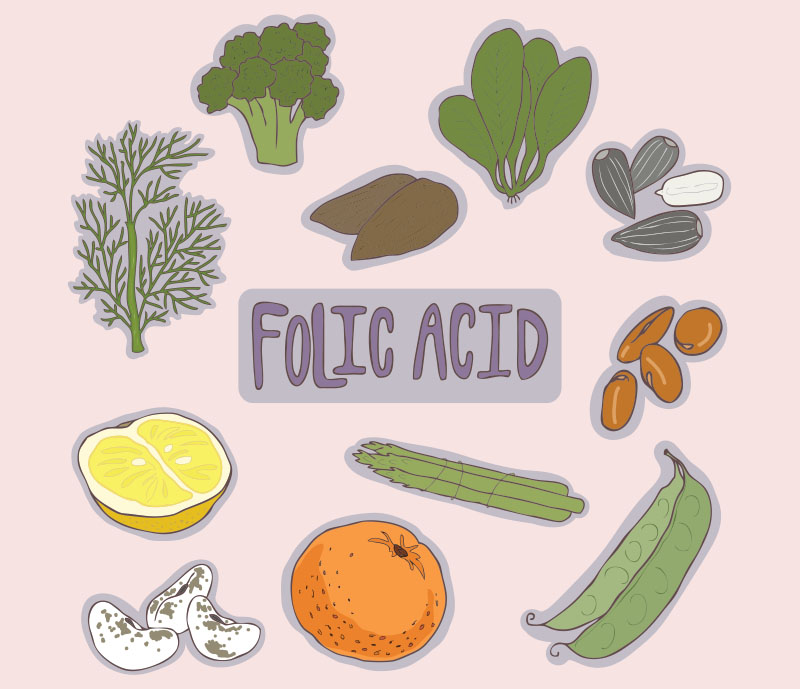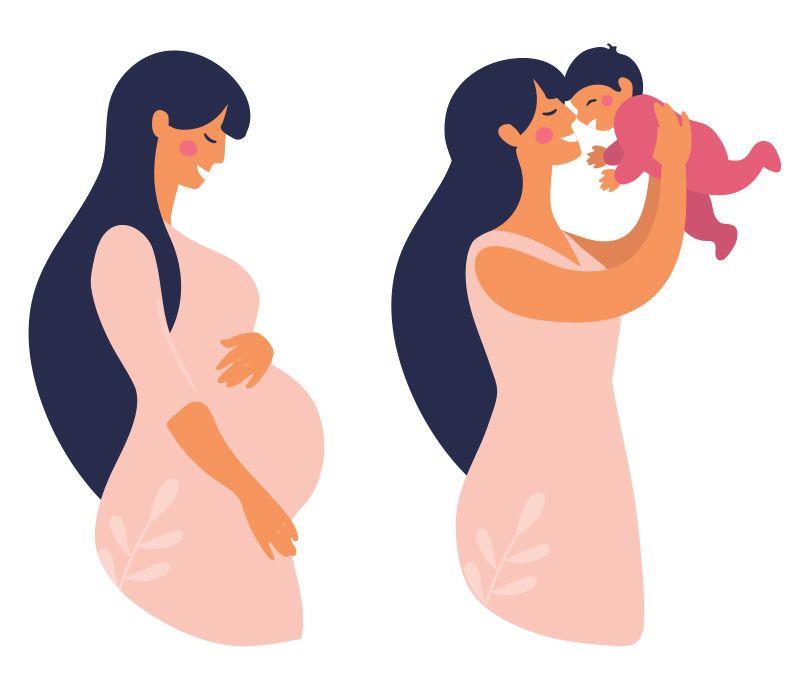Pregnancy Diet & Lifestyle
What are the lifestyle and nutritional components that make for a healthy pregnancy?
The Academy of Nutrition and Dietetics recommends these key guidelines for a healthy lifestyle during pregnancy:
- Appropriate weight gain
- A balanced diet
- Appropriate and timely vitamin and mineral supplementation
- Regular exercise
How many extra calories from food will I need during pregnancy?
A pregnant woman who begins pregnancy at her ideal weight will need approximately 300 extra calories every day to maintain a healthy pregnancy. These extra calories should come from a balanced diet of fruits, vegetables, whole grains, and protein sources. Adequate intake of healthy fluids is also important and can reduce constipation which some pregnant women experience.
For women who begin pregnancy overweight, you should talk with your provider and your nutritionist to know exactly how many calories you need throughout your pregnancy.
How much extra fluids do I need during pregnancy?
Healthy fluid intake is as important as healthy food intake during pregnancy. Follow these recommendations:

- Drink several glasses of water each day in addition to the fluids you get from any juices and soups. Talk to your nutritionist or healthcare provider about whether you need to restrict your intake of caffeine and artificial sweeteners during your pregnancy.
- Do not drink any form of alcohol during your pregnancy. A baby can be exposed to the same level of alcohol as the mother during pregnancy so there is no known safe amount of alcohol during pregnancy.
Fertility, Pregnancy, and Breastfeeding Nutrition
From trying to conceive through managing a healthy pregnancy to establishing a healthy routine after having a baby, our team works to craft an evidence-based strategy that actually works for you. Through regular check-ins and follow-up care, we track your progress and help you adjust your plan accordingly.
We’ll consider every aspect of your lifestyle including your current state of health, what and how much you eat, how and when you exercise, what medications you use and how you deal with stress. You can manage your nutrition and health under the guidance of the LifeStyle Medical Centers’ team. We’ll work together to manage your weight, reduce the risk of complications, and increase your chances of having a successful pregnancy.
We can also help you navigate the challenges of new parenthood, including breastfeeding your baby.
What are the extra vitamins or minerals I need during pregnancy?
Many nutritionists, health care providers, or midwives will prescribe a prenatal supplement before conception or shortly afterward. This is done to make sure that all of your nutritional needs are optimized during your pregnancy. Prenatal supplements do not replace a healthy diet, they only enhance it.
Folic Acid
Folic acid is a B vitamin that can help prevent major birth defects. The U.S. Public Health Service recommends that women of childbearing age take 400 micrograms (0.4 mg) of folic acid each day. Folic acid is a nutrient found in:
- Most berries, nuts, citrus fruits, fortified breakfast cereals, and nuts
- Some green leafy vegetables
- Most berries, nuts, beans, citrus fruits, and fortified breakfast cereals
- Some vitamin supplements
Folic acid can help reduce the risk of neural tube defects, which are birth defects of the brain and spinal cord. Neural tube defects can lead to varying degrees of paralysis, incontinence and sometimes intellectual disability.

Folic acid is most helpful during the first 28 days after conception. That is when most neural tube defects occur. Unfortunately, many women do not realize that they are pregnant before 28 days. So, your intake of folic acid should ideally begin before conception and continue throughout your pregnancy. Your healthcare provider, midwife, or nutritionist will recommend the appropriate amount of folic acid that’s right for you to meet your individual needs. For example, women who take anti-epileptic drugs may need to take higher doses of folic acid to prevent neural tube defects. Talking with your healthcare providers before conceiving is always a wise idea.
What are some of the ideal foods to eat during pregnancy?
There are some of the optimal foods for your health and your fetus’s development during pregnancy:
- Vegetables: sweet potatoes, carrots, spinach, pumpkin, cooked greens, tomatoes, and red sweet peppers (for vitamin A and potassium)
- Fruits: mangoes, cantaloupe, oranges, honeydew, prunes, bananas, apricots, oranges, and red or pink grapefruit (for potassium)
- Dairy: fat-free or low-fat yogurt, skim or 1% milk, soymilk, or lactose-free milk (for calcium, potassium, vitamins A and D)
- Grains: cooked cereals or granola, grapenut cereal (for iron and folic acid)
- Proteins: beans and peas; lean beef, lamb and pork, nuts and seeds; salmon, trout, herring, sardines, and pollock
What are some of the foods I need to avoid during pregnancy?
Your nutritionist might advise you to avoid these foods during your pregnancy to optimize your health and the health of your developing fetus:
- Unpasteurized milk and foods made with unpasteurized milk, such as soft cheeses
- Hot dogs and processed luncheon or deli meats (unless they are heated until steaming hot before serving)
- Raw or undercooked eggs, seafood, meat. Do not eat sushi made with raw fish
- Refrigerated meat spreads or pâté
- Refrigerated smoked seafood

Following these guidelines for safe food handling during pregnancy is smart
Follow these general food safety guidelines when handling and cooking food during your pregnancy:
- Wash. Rinse all raw produce under running tap water before eating, cutting, or cooking.
- Clean. Wash your hands, knives, countertops, cutting boards after handling and preparing uncooked foods.
- Cook. Cook all meats to a safe internal temperature verified by a food thermometer.
- Chill. Refrigerate all perishable food properly and throw out food that isn’t fresh.
What are some of the other healthy guidelines I should be following during my pregnancy?
- Diabetes: If you have diabetes it is important to have the best possible control of your diabetes while pregnant as poor control can increase the chance of some birth defects or other problems. Poor control can also cause serious complications for a pregnant woman.
- High blood pressure: If you have high blood pressure, you want to keep it under tight control during pregnancy to avoid complications for you and your developing baby.
- Smoking cigarettes: Smoking during pregnancy can cause babies to be preterm, low weight, stillborn, or have certain defects.
- Smoking marijuana: The chemicals in marijuana (particularly the THC) pass through your system to your baby and can hurt the baby’s development. Talk to your healthcare provider for specific guidance.
- Vaccinations: your baby gets disease immunity from you and this immunity can protect your baby from some diseases during the first few months of life before it starts to wear off with time. Ask your provider if you are current on the vaccines you should be current on.
- Infections: some infections can harm a developing baby so be sure to check with your healthcare provider if you think you have one
- Medications: Taking certain medications during your pregnancy can cause serious birth defects including prescriptions, over-the-counter, and dietary or herbal supplements. . Talk to your healthcare provider.
- HIV: Get tested for HIV before pregnancy if possible. If you have HIV there are many steps you can take to not give HIV to your baby.
- West Nile virus: Take precautions to reduce your risk for West Nile virus and other mosquito-borne infections by avoiding mosquito exposure as best you can, avoiding sitting outside at dusk, using safe mosquito repellent, and wearing clothing to cover your body.
- Depression: Depression is both common and treatable before, during, and after pregnancy. Talk to your healthcare provider as soon as you can if you are showing signs of depression, such as persistent feelings of sadness, loss of interest in usual activities, trouble sleeping, eating, concentrating, and thoughts of self-harm.
- Environmental exposures: Take precautions to limit uncertain environmental exposures and learn about additional supplies you might use in the event of an environmental emergency in your area that might include fumes, radiation, smoke, or liquid exposures.
- Travel: If you are thinking about national or international travel, talk to your healthcare provider in case air or other travel is not recommended given how your pregnancy is going. If you are given a green light, be sure to know about the quality of care during transit and at your destination.
- Bleeding and clotting disorders: These disorders can cause serious problems during pregnancy, including miscarriage. Talk to your provider if you have a bleeding or clotting disorder.

At LifeStyle Medical Centers we have the expertise to help you create a pregnancy program that works for you with regular check-ins and follow-ups so you can manage your nutrition and health under the guidance of our professional team.
Ready to get started on your healthiest pregnancy possible?
Let’s talk about your health.
Call us today @ (919)354-7077
Sources:
- Centers for Disease Control and Prevention, https://www.cdc.gov/.
- Mayo Clinic, https://www.mayoclinic.org/.
- Johns Hopkins Medicine, https://www.hopkinsmedicine.org/health.
- Cleveland Clinic, https://my.clevelandclinic.org/health/diseases.
